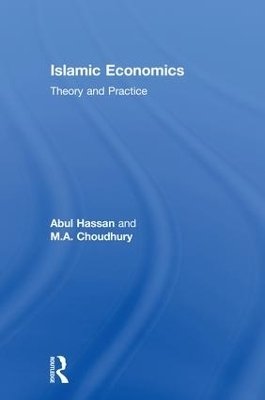
Islamic Economics
Routledge (Verlag)
978-1-138-36241-3 (ISBN)
This book is a comprehensive study, which provides informed knowledge within the field of Islamic economics. The authors lay down the principal philosophical foundation of a unique and universal theory of Islamic economics by contrasting it with the perspectives of mainstream economics. The methodological part of the theory of Islamic economics arises from the ethical foundations of the Qur'an and the Sunnah (tradition of the Prophet) along with learned exegeses in an epistemological derivation of the postulates and formalism of Islamic economics. This foundational methodology will be contrasted with the contemporary approaches of the random use of mainstream economic theory in Islamic economics.
The book establishes the methodological foundation as the primal and most fundamental premise of the study leading to scientific formalism and the prospect of its application. By way of its Islamic epistemological explanation (philosophical premise) in the form of logical formalism and the use of simple real-world examples, the authors show the reader that the scientific nature of economics in general and Islamic economics in particular rests on the conception of the scientific worldview.
With its uniquely comparative approach to mainstream economics, this book facilitates a greater understanding of Islamic economic concepts. Senior undergraduate and graduate students will gain exposure to Islamic perspectives of micro- and macroeconomics, money, public finance, and development economics. Additionally, this book will be useful to practitioners seeking a greater comprehension of the nature of Islamic economics. It will also enable policymakers to better understand the mechanism of converting institutions, such as public and social policy perspectives.
Abul Hassan is a Research Scientist II/Associate Professor in Finance and Economics at the CRE-IBF, Research Institute, King Fahd University of Petroleum and Minerals, Dhahran, Saudi Arabia. M.A. Choudhury is a Professor in Economics at the Department of Shariah and Economics, Academy of Islamic Studies, University of Malay, Malaysia.
Preface; Acknowledgements; Glossary of Arabic terms; 1 How to study Islamic economics as science in reference to the Qur’an and the Sunnah; 2 Ethics in Islamic economics; 3 Islamic economic methodology; 4 The Scope of Islamic economics; 5 The formulation of the Islamic economic model; 6 Islamic participatory instruments and the ethical dimensions; 7 The dual theories of consumer behaviour and markets; 8 Dual theories of the firm; 9 Macroeconomic theory in mainstream and Islamic economic perspectives; 10 Monetary, financial, and real economy issues in Islamic economics and comparative perspectives; 11 Fiscal policy in Islamic economy; 12 Theory of taxation in Islamic economy; 13 Public finance in Islam; 14 Mobilization of resources for Islamic economic development; 15 Development goals and strategies in Islamic economy; 16 Conclusion: What have we learnt? Quo vadis?; Index
| Erscheinungsdatum | 04.02.2019 |
|---|---|
| Zusatzinfo | 3 Tables, black and white; 35 Line drawings, black and white; 35 Illustrations, black and white |
| Verlagsort | London |
| Sprache | englisch |
| Maße | 156 x 234 mm |
| Gewicht | 453 g |
| Themenwelt | Sozialwissenschaften ► Soziologie ► Spezielle Soziologien |
| Wirtschaft ► Betriebswirtschaft / Management ► Finanzierung | |
| Betriebswirtschaft / Management ► Spezielle Betriebswirtschaftslehre ► Bankbetriebslehre | |
| Wirtschaft ► Volkswirtschaftslehre | |
| ISBN-10 | 1-138-36241-7 / 1138362417 |
| ISBN-13 | 978-1-138-36241-3 / 9781138362413 |
| Zustand | Neuware |
| Haben Sie eine Frage zum Produkt? |
aus dem Bereich


